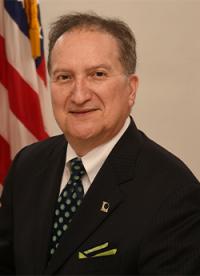AHRQ Views: Blog posts from AHRQ leaders
Arm in Arm with AcademyHealth, AHRQ is Poised to Build on Successes in Health Services Research
JUN
27
2024

We are halfway through AHRQ’s 35th anniversary year, and in this third and final blog post about our commemoration, I would like to reflect on the role of AHRQ and our research investments, which have catalyzed major innovations in clinical care and healthcare delivery.
In my most recent blog post, I described the agency’s role among the three intertwining pathways—biomedical research, technology assessment, and health services research—essential to medical progress and delivering high-quality healthcare. As an independent science agency, AHRQ has served as the federal home for the two latter pathways to achieve its singular mission to improve healthcare in our nation. It has created a lasting body of work.
This blog is auspicious, because the 2024 AcademyHealth Annual Research Meeting officially begins on Saturday. The conference theme, “Today’s research driving tomorrow’s outcomes,” is very similar to AHRQ’s 35th celebration theme: "Today's Research, Tomorrow's Healthcare." For more than 35 years, AcademyHealth and AHRQ—and their predecessor organizations—have worked together to support the best and brightest in health services research to achieve future improvements in healthcare and patient outcomes.
AHRQ and AcademyHealth also share a leadership connection. Dr. Lisa Simpson retired in March after 13 years as president and CEO of AcademyHealth, served as deputy director of AHRQ from 1996 to 2002, and helped oversee AHRQ’s transition from the Agency for Health Care Research and Policy. Today, I welcome Dr. Aaron Carroll, the new president and CEO of AcademyHealth, who has been an AHRQ grantee. Stay tuned for a joint blog post from Dr. Carroll and me in the next few weeks, when we’ll discuss our organizations’ relationship and how we’ll work together.
AHRQ’s efforts over the last 35 years have changed healthcare in many ways and in many areas. Our work in data and analytics, health systems research, and practice improvement continues to resonate with patients, health system leaders, clinicians, researchers, caregivers, and others. For example:
- AHRQ’s research supported efforts to significantly reduce in-hospital adverse events in the decade before the onset of the COVID-19 pandemic. In a JAMA article, researchers found that the relative risk of experiencing an adverse event diminished for five patient groups: 41 percent for heart attack patients, 27 percent for heart failure patients, 36 percent for pneumonia patients, 41 percent for major surgery patients, and 18 percent for patients with all other conditions.
- AHRQ continues to help healthcare systems make great strides in improving patient safety. Post-pandemic trends in patient safety improvement reversed course between 2020 and 2021. To regain momentum, AHRQ, at the behest of Department of Health and Human Services (HHS) Secretary Xavier Becerra, launched the National Action Alliance for Patient and Workforce Safety as a public-private partnership effort to regain lost ground. The good news is that 85 percent of hospitals have made progress on at least one healthcare-associated infection among the three tracked by our Alliance partners, LeapFrog, since November 2022.
- At the height of the COVID-19 pandemic, AHRQ partnered with the University of New Mexico’s ECHO Institute in Albuquerque and the Institute for Healthcare Improvement in Boston to establish a National Nursing Home COVID Action Network. The network provided free training and mentorship to nursing homes nationwide to increase the implementation of evidence-based infection prevention and safety practices to protect residents and staff.
- In 2022, AHRQ released a primer to help healthcare organizations reduce their carbon footprint and protect communities from climate threats. In alignment with HHS goals, Reducing Healthcare Carbon Emissions: A Primer on Measures and Actions to Mitigate Climate Change features a prioritized set of measures and potential interventions to reduce healthcare’s greenhouse gas emissions.
- AHRQ created EvidenceNOW: Advancing Heart Health in Primary Care to help more than 5,000 primary care practices in urban and rural communities use the latest evidence to improve the heart health of nearly 8 million patients. Launched in 2015, EvidenceNOW has expanded and now includes strategies to manage unhealthy alcohol use and urinary incontinence and build state capacity for additional advances in primary care.
I am eager to attend the AcademyHealth meeting to hear from our talented colleagues about their ongoing work and the future possibilities of health services research and technology assessment to make healthcare high-quality, no matter the setting. In our 35th year, AHRQ continues to work with the best and brightest in health services research and policy to improve healthcare for all in our nation. If you are attending the annual research meeting, drop by the AHRQ booth. I look forward to seeing you there.
Dr. Valdez is director of AHRQ.
Get more AHRQ news, sign up for AHRQ news via email and follow AHRQ on Twitter, LinkedIn, Facebook, and YouTube.



